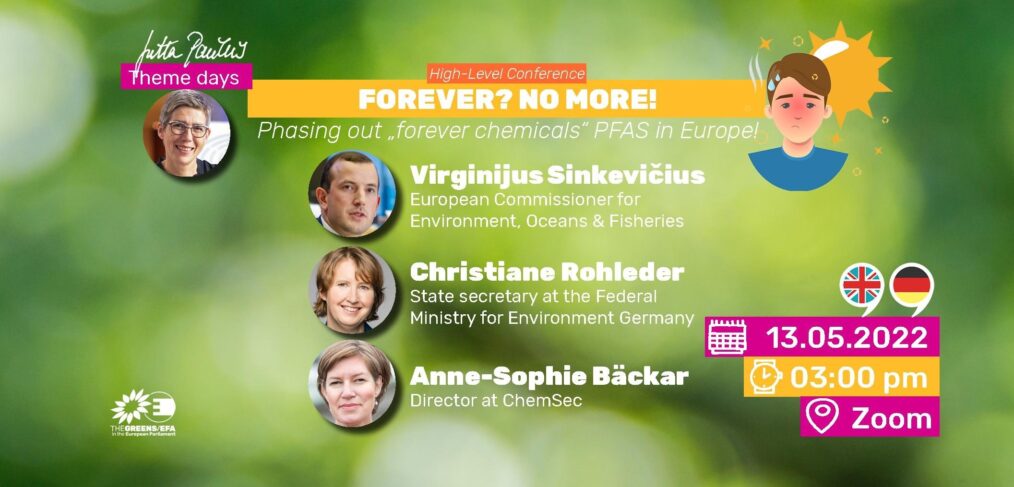
High-Level-Conference: “Forever? No More! Phasing out “forever chemicals” PFAS in Europe.”
+++Here you can find the recording+++
Friday 13th of May, 3:00-4:30 PM CEST
The term PFAS refers to a chemical group of more than 4700 substances in which certain carbon atoms have bonds to several fluorine atoms. Their physicochemical properties are very similar: they are water repellent, dirt repellent and grease repellent. PFAS are used in many applications, such as fire-fighting foams, Teflon pans, in the textile industry, and in the coating of cardboard tableware. However, because carbon-fluorine bonds are among the most stable chemical bonds, PFAS are therefore particularly difficult to degrade and remain unchanged in the environment for very long periods of time, thus being dubbed “forever chemicals.” As a result, PFAS accumulate in groundwater, surface waters and soils and have health effects on humans and animals. PFAS accumulate also in the body and have been linked to kidney cancer, liver damage, testicular cancer, and thyroid disease, and are suspected of having many other health effects. The health costs caused by PFAS in the European Economic Area were estimated at 52-84 billion euros per year in 2019 by the Nordic Council. Therefore, it is important to finally restrict the use and spread of PFAS and to locate and remove PFAS from contaminated sites.
As the Commission promised in its Chemical Strategy for Sustainability to phase out highly problematic substances such as per- and polyfluoroalkyl substances (PFAS), unless their use is proven essential for society, a couple of proposals are already on their way. The European Chemicals Agency (ECHA) is currently working on a restriction proposal on the use of PFAS in firefighting foams.
A more ambitious approach is taken by the Netherlands, Germany, Norway, Sweden and Denmark who are working on a universal PFAS restriction proposal. This proposal will be submitted by the end of 2022.
I would like to discuss the ongoing and upcoming PFAS restrictions with you! For this, I am happy to welcome a high-level panel with EU Environment Commissioner Virginijus Sinkevičius, Director at ChemSec (International Chemical Secretariat) Anne-Sofie Bäckar and State Secretary at the Federal Ministry for the Environment, Nature Conservation, Nuclear Safety and Consumer Protection in Germany Dr. Christiane Rohleder.
We would be very happy if you could join us and discuss with us how these “forever chemicals” could best be addressed.
The event will be held in English and German with translation.
Panellists:
- Virginijus Sinkevičius, European Commissioner for the Environment, Oceans and Fisheries
- Anne-Sofie Bäckar, Director at ChemSec (International Chemical Secretariat)
- Christiane Rohleder, State secretary at the Federal Ministry for the Environment, Nature Conservation, Nuclear Safety and Consumer Protection (BMUV), Germany
